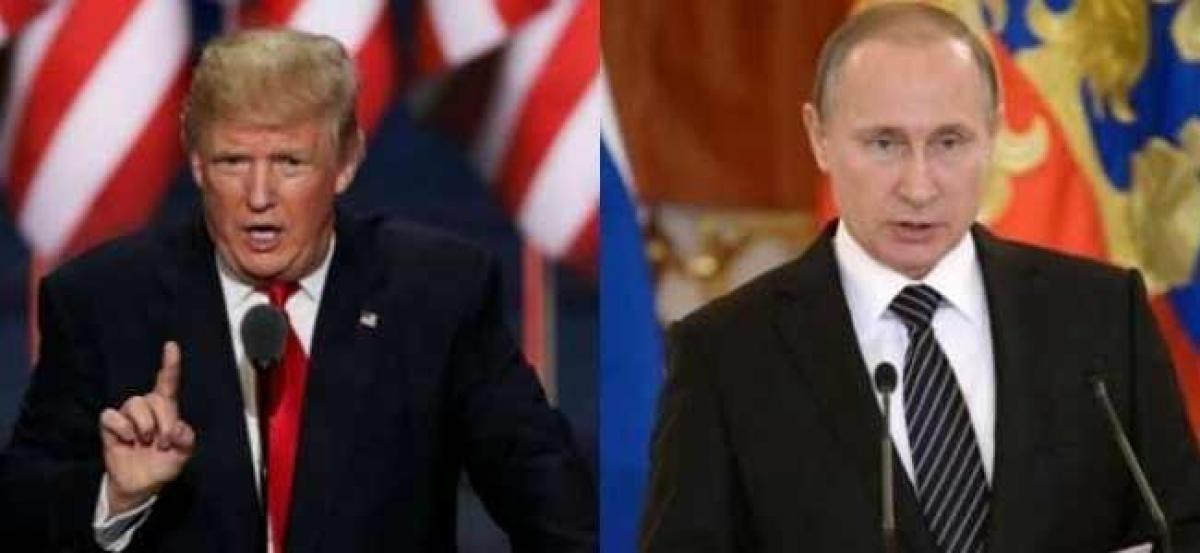Live
- India's growth on resilient trajectory, equity markets in consolidation phase
- KJo on 23 years of ‘Kabhi Khushi Kabhie Gham’: One of those pinch me moments
- WPL 2025 auction: Nandini, Kamalini set to be most sought-after names
- MP CM to inaugurate Sarsi resort in Shahdol, 200-bed hospital in Mauganj today
- TGPSC makes arrangements for Group-2 exams to be held tomorrow
- WPL 2025 Auction: When and where to watch, date, time, live streaming, venue
- Japan: Citizens protest US military-related sexual violence
- Buy on dips strategy working well in Indian stock market amid sharp rebound
- Sri Lanka concludes sovereign bond restructuring
- Lal Krishna Advani hospitalised at Delhi's Apollo Hospital
Just In

Russia and the United States were on a collision course ahead of a UN Security Council vote on Thursday on the fate of a UN-led probe to determine who is behind chemical attacks in Syria\'s six-year war.
Russia and the United States were on a collision course ahead of a UN Security Council vote on Thursday on the fate of a UN-led probe to determine who is behind chemical attacks in Syria's six-year war.
The United States and Russia, Syria's ally, have put forward rival draft resolutions on renewing for a year the mandate of the Joint Investigative Mechanism (JIM), tasked with investigating Syria's toxic gas attacks.
After negotiations failed to bridge differences, the rivals each called for a council vote on their draft resolutions today, hours before the JIM's mandate expires at midnight.
Diplomats said they expected Russia to veto the US- drafted measure, which would be the 10th time Moscow has used its veto power at the council to block action targeting its Syrian ally.
The Russian text is unlikely to garner the nine votes required for adoption, diplomats said.
"The United States hopes the Security Council will stand united in the face of chemical weapons use against civilians and extend the work of this critical group," said the US mission in a statement.
"Not doing so would only give consent to such atrocities while tragically failing the Syrian people who have suffered from these despicable acts."
Russia has sharply criticised the JIM after its latest report blamed the Syrian air force for a sarin gas attack on the opposition-held village of Khan Sheikhun that left scores dead.
The attack on April 4 triggered global outrage as images of dying children were shown worldwide, prompting the United States to launch missile strikes on a Syrian air base a few days later.
Washington and its allies have blamed President Bashar al-Assad's government for the Khan Sheikhun attack, but Syria has denied using chemical weapons, with strong backing from Russia.
In its draft, Russia insisted that the panel's findings on Khan Sheikhun be put aside to allow for another "full-scale and high-quality investigation" by the JIM, which would be extended for a year.
During a council vote in late October, Russia vetoed a US-drafted resolution on a one-year extension, arguing that it did not want to decide on the fate of the panel before the Khan Sheikhun report.
The United States, Britain and France have insisted that the JIM should be allowed to continue its work and that dozens of other cases of chemical weapons use in Syria must be investigated.
Britain said ending the investigation would mean that perpetrators of chemical weapons attacks in Syria will go unpunished.
"The only victors would be people who want to use chemical weapons in Syria, which is the Assad regime plus Daesh, and I think everyone in the Security Council would be shooting ourselves in the foot if we allowed that to happen," said British Ambassador Matthew Rycroft.
Daesh is an Arabic-derived acronym that refers to the Islamic State group.
Russian Ambassador Vassily Nebenzia said this week that scrapping the chemical weapons probe in Syria "may send a bad signal, but the way the investigation has been conducted sends an even worse signal."
The joint UN-Organization for the Prohibition of Chemical Weapons (OPCW) panel was set up by Russia and the United States in 2015 and unanimously endorsed by the council, which renewed its mandate last year.
A resolution requires nine votes to be adopted at the council, but five countries -- Russia, Britain, China, France and the United States -- can block adoption with their veto power.

© 2024 Hyderabad Media House Limited/The Hans India. All rights reserved. Powered by hocalwire.com







